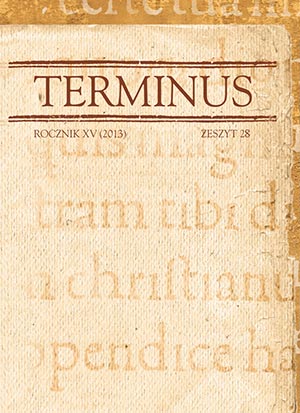Niektóre problemy związane z edycją heraldycznego dzieła Szymona Okolskiego
Some Problems Concerning Any Future Edition of the Heraldic Work by Szymon Okolski
Author(s): Magdalena PiskałaSubject(s): Literary Texts
Published by: Wydawnictwo Uniwersytetu Jagiellońskiego
Keywords: Szymon Okolski; heraldry; critical editions of neo-Latin texts
Summary/Abstract: The article discusses one of the fundamental problems in preparing critical editions of old literature: issues concerning quotations and other intertextual references. Orbis Polonus by Szymon Okolski constitutes excellent material for such a discussion. Though essentially an armorial, apart from typically heraldic and historical content, it contains extensive passages of moral instruction based on symbolic interpretation of given armorial bearings. Within such discourse, the readers receive much information from various fields of knowledge. This knowledge, however, is not systematised in any way; the author is simply citing information, famous sayings or poetic fragments that have occurred to him as related to the coat of arms he is writing about. This strategy results in an erudite discourse built from numerous quotations and references whose style researchers call “Lipsian.” Editorial work on such a text requires the editor to establish the scope and depth of intertextual references, which seldom are distinguished clearly, and to reconstruct the author’s reading list. Without that it would be impossible to eliminate errors that found their way into the only edition of the text so far, whose successive volumes were published by the printer Franciszek Cezary in 1641–45. This trivial statement of fact promises titanic work to any future editor as Okolski made use of books in three languages (Latin, Polish and Italian) and flaunted his knowledge of Greek literature, although he probably did not know Greek. His reading list comprises various works, from the Bible and classical literature, to medieval theological writings, to the newest literature of his day. Heraldic literature, histories and documents from family archives appear within the discourse next to works on natural history, emblems, occasional literature, excerpts from apophthegmatic collections, epistles or hagiographies. Difficulties with correct attribution of citations are aggravated by the fact that references to other texts are often indirect as Okolski used anthologies and compendia. This not only makes it difficult to find sources of quotations, but also raises questions as to the extent of possible corrections in cases where the quotes are distorted or erroneously attributed: often the distortions are due not to Okolski’s or the compositor’s inattentiveness but to uncritical copying of the intermediate text. The situation of a potential editor gets worse with popular references as the more popular a quote, the harder it is to establish its exact source. Changes to the original text made by the author intentionally to emphasise his point are yet another matter. Not all such instances are obvious and it is not always easy to determine what purpose they serve, as sometimes the only indication of their intentional nature is the fact that they reappear someplace else. The issues discussed here are but a fraction of problems that an editor of Orbis Polonus would encounter.
Journal: TERMINUS
- Issue Year: 15/2013
- Issue No: 3 (28)
- Page Range: 313-333
- Page Count: 21
- Language: Polish

